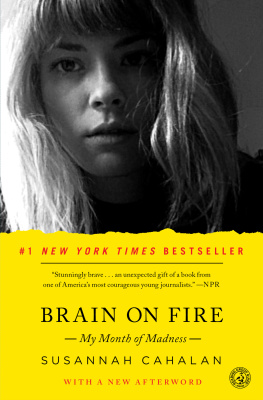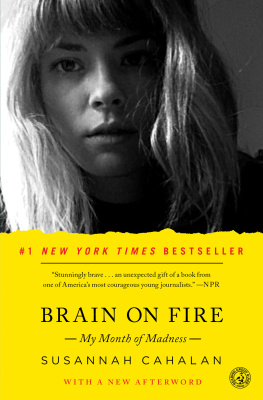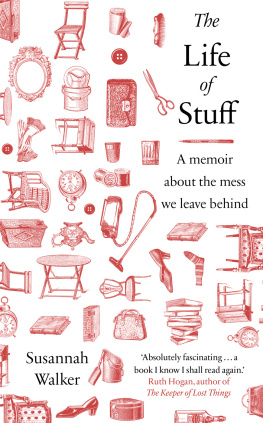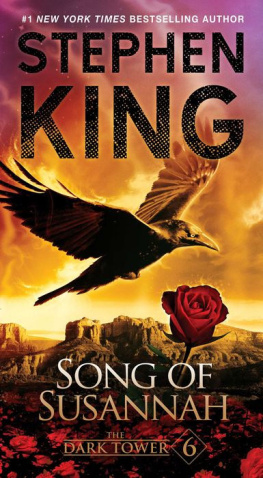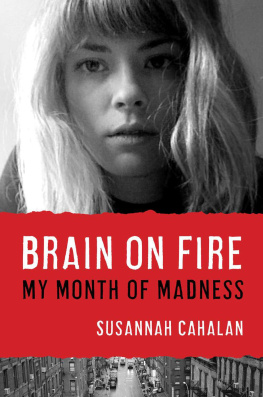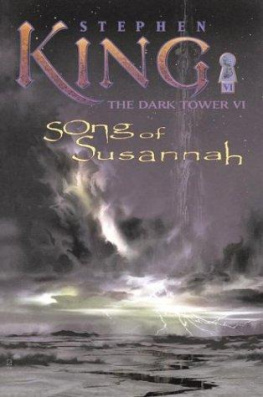Cahalan Susannah - Brain on fire : my month of madness
Here you can read online Cahalan Susannah - Brain on fire : my month of madness full text of the book (entire story) in english for free. Download pdf and epub, get meaning, cover and reviews about this ebook. City: New York, United States, year: 2012, publisher: Free Press, genre: Detective and thriller. Description of the work, (preface) as well as reviews are available. Best literature library LitArk.com created for fans of good reading and offers a wide selection of genres:
Romance novel
Science fiction
Adventure
Detective
Science
History
Home and family
Prose
Art
Politics
Computer
Non-fiction
Religion
Business
Children
Humor
Choose a favorite category and find really read worthwhile books. Enjoy immersion in the world of imagination, feel the emotions of the characters or learn something new for yourself, make an fascinating discovery.
- Book:Brain on fire : my month of madness
- Author:
- Publisher:Free Press
- Genre:
- Year:2012
- City:New York, United States
- Rating:3 / 5
- Favourites:Add to favourites
- Your mark:
Brain on fire : my month of madness: summary, description and annotation
We offer to read an annotation, description, summary or preface (depends on what the author of the book "Brain on fire : my month of madness" wrote himself). If you haven't found the necessary information about the book — write in the comments, we will try to find it.
One day in 2009, twenty-four-old Susannah Cahalan woke up alone in a strange hospital room, strapped to her bed, under guard, and unable to move or speak. A wristband marked her as a flight risk, and her medical records, chronicling a monthlong hospital stay of which she had no memory at all, showed hallucinations, violence, and dangerous instability. Only weeks earlier, Susannah had been on the threshold of a new, adult life, a healthy, ambitious college grad a few months into her first serious relationship and a promising career as a cub reporter at a major New York newspaper. Who was the stranger who had taken over her body? What was happening to her mind? In this narrative, Susannah tells the astonishing true story of her inexplicable descent into madness and the lifesaving diagnosis that nearly didnt happen. A team of doctors would spend a month, and more than a million dollars, trying desperately to pin down a medical explanation for what had gone wrong. Meanwhile, as the days passed and her family, boyfriend, and friends helplessly stood watch by her bed, she began to move inexorably through psychosis into catatonia and, ultimately, toward death. Yet even as this period nearly tore her family apart, it offered an extraordinary testament to their faith in Susannah and their refusal to let her go. Then, neurologist Souhel Najjar joined her team and, with he help of a lucky, ingenious test, saved her life. He recognized the symptoms of a newly discovered autoimmune disorder in which the body attacks th brain, a disease now thought to be tied to both schizophrenia and autism, and perhaps the root of demonic possessions throughout history. This story is the powerful account of one womans struggle to recapture her identity and to rediscover herself among the fragments left behind. Using all her considerable journalistic skills, and building from hospital records and surveillance video, interviews with family and friends, and excerpts from the deeply moving journal her father kept during her illness, Susannah pieces together the story of her lost month to write an unforgettable memoir about memory and identity, faith and love. Read more...
Abstract: The story of twenty-four-year-old Susannah Cahalan and the life-saving discovery of the autoimmune disorder that nearly killed her -- and that could perhaps be the root of demonic possessions throughout history.
One day in 2009, twenty-four-old Susannah Cahalan woke up alone in a strange hospital room, strapped to her bed, under guard, and unable to move or speak. A wristband marked her as a flight risk, and her medical records, chronicling a monthlong hospital stay of which she had no memory at all, showed hallucinations, violence, and dangerous instability. Only weeks earlier, Susannah had been on the threshold of a new, adult life, a healthy, ambitious college grad a few months into her first serious relationship and a promising career as a cub reporter at a major New York newspaper. Who was the stranger who had taken over her body? What was happening to her mind? In this narrative, Susannah tells the astonishing true story of her inexplicable descent into madness and the lifesaving diagnosis that nearly didnt happen. A team of doctors would spend a month, and more than a million dollars, trying desperately to pin down a medical explanation for what had gone wrong. Meanwhile, as the days passed and her family, boyfriend, and friends helplessly stood watch by her bed, she began to move inexorably through psychosis into catatonia and, ultimately, toward death. Yet even as this period nearly tore her family apart, it offered an extraordinary testament to their faith in Susannah and their refusal to let her go. Then, neurologist Souhel Najjar joined her team and, with he help of a lucky, ingenious test, saved her life. He recognized the symptoms of a newly discovered autoimmune disorder in which the body attacks th brain, a disease now thought to be tied to both schizophrenia and autism, and perhaps the root of demonic possessions throughout history. This story is the powerful account of one womans struggle to recapture her identity and to rediscover herself among the fragments left behind. Using all her considerable journalistic skills, and building from hospital records and surveillance video, interviews with family and friends, and excerpts from the deeply moving journal her father kept during her illness, Susannah pieces together the story of her lost month to write an unforgettable memoir about memory and identity, faith and love
Cahalan Susannah: author's other books
Who wrote Brain on fire : my month of madness? Find out the surname, the name of the author of the book and a list of all author's works by series.

